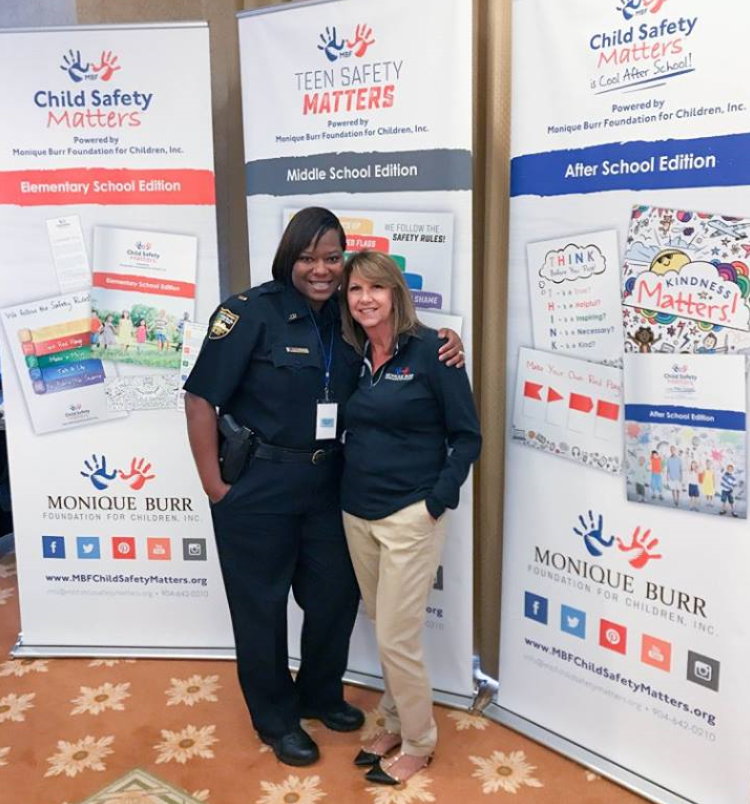Meet Lynn Layton, the Executive Director of MBF!
Lynn was born in Valdosta, GA, and has lived in Jacksonville for 29 years. She is a graduate of Valdosta State College where she studied criminal justice and sociology, and an alumni member of Gamma Mu chapter of the Kappa Delta sorority. Lynn is married to Glenn Layton and together they have two children, Clark Fouraker and Mallory Layton.
Lynn joined the Monique Burr Foundation for Children as executive director in August 2008. In her role, she is responsible for carrying out the Foundation’s mission to provide bullying and child abuse prevention education to children and youth in kindergarten through eighth grade. To date, MBF has trained over 2,000 facilitators who have implemented MBF Child Safety Matters lessons to over 1.6 million students. Lynn and the team are excited about the upcoming school year and reaching more students with MBF Child Safety Matters, as well as with the MBF Teen Safety Matters program in schools throughout Florida and the United States. She is proud to come to work each day knowing that the work the foundation does, the partnerships that are formed, and the money that is raised truly makes a difference in the lives of children.
Read on to learn more from Lynn about what it means to be part of the MBF team and how the work the Foundation does is impacting the lives of children around the state and beyond!
Q: What does “Child Safety Matters” mean to you?
We named the program “Child Safety Matters” because we are talking about child safety, AND CHILD SAFETY DOES MATTER! If we are being honest, it is not children’s responsibility to keep themselves safe. However, there are things children can do to help adults keep them safe. If the child learns how to recognize and understand red flags when they may not be safe, what to say to an adult if they do not feel safe, and that they need to seek the help of a Safe Adult, they are more likely to remain safe. Keeping a child safe so that they can grow up to be a healthy, happy adult ensures that we will be a healthier, less violent, more productive, and smarter country. Child victimization is really at epidemic proportions right now and only getting worse. I know that we can’t stop child abuse or bullying, but we can do our best to improve a child’s chance to grow up safely.
Q: Which MBF event is your favorite?
A Night at Roy’s. It is always a personal event for me. The night before I interviewed for this job, I attended the event as a guest. It was significantly different then and there were about 50 people in attendance. Every year now, I always take a moment at some time during the night to reflect on that time, how much we have grown, the true difference we are making in the safety of children, and how blessed I am to work with such wonderful people. It is so rewarding to look around the crowd and see how happy people are at that event.
Q: What has been the proudest moment in your position so far?
I don’t know if this is the proudest moment or not, but certainly one I will never forget. It was the very first live facilitator training we were going to host for Duval County School Counselors at the Schultz Training Facility on Beach Blvd. Ed was coming to speak for the first time to thank the school counselors for their commitment and willingness to implement our program in their schools. I woke up that morning full of excitement – I didn’t know where we would end up with this program, but I felt like we had a real opportunity to help protect kids. On my way to the Schultz Center, I realized that this day, October 22nd, was the anniversary of Monique’s death – and that the Schultz Center was directly across the street from the cemetery where she is buried. Ed came and spoke that day and then left to go to the cemetery to spend some quiet time at Monique’s grave. It was just one of many times that her presence and our work seem closely related. There are 364 other days that training could have been scheduled and many other locations, but we were there to launch our program and it felt like her spirit was too.
Q: Have you ever been inspired by a Safe Adult?
I am always inspired by our school counselors who implement our program in their schools. They do not receive any additional payment for the extra work or time, yet year after year, they understand the importance of prevention education and make the time to ensure their students have the best safety education possible. They see on a daily basis the issues kids are dealing with in school and at home. Our program helps to give children words to seek help and to understand that they deserve to be safe. School Counselors are our first line of defense in protecting children and to me a great example of a Safe Adult. They listen, ask questions when needed, and make a report when necessary.
Stay tuned for more installments in the Meet the MBF Staff blog series to get to know our team!
Categorized in: Monique Burr Foundation News


